Hospital Adventures
My adventures in Hong Kong & China hospitals
The 2018 experience was probably more pleasant because I had more realistic expectations than I had in 2014 (scroll down for the older, longer, more humorous story). I’ve also posted a bit about my 2005 pneumonia.
⇔by Michael’ Krigline, 2018; wp.krigline.com ⇔
May-Jun 2018
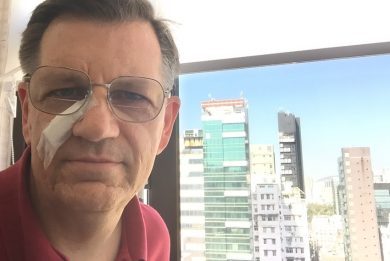
I’ll look like this for a week. This selfie was taken in our kitchen; our office is the 9th floor of that green building.
By Jan 11, I’d noticed that a “dot” on my face was not healing. It would bleed for a week or so, and then clear up, but return. On Mar 30, while visiting Kunming, I went to the International Clinic (they had helped us several times when we lived there), where an American plastic surgeon did a biopsy. (This was done “outpatient”, and I was able to wear my normal clothes.) Actually, he biopsied two spots; one near my nose turned out to be normal, but the other (the bleedy one) was a basal cell carcinoma. I got an appointment at Queen Elizabeth Hospital for April 19, at which time the doctor agreed to take it off May 29.
I was very happy with how everything went on May 29 at the Queen Elizabeth hospital, as they removed a carcinoma from my face “with wide margin.” I arrived as scheduled at 9am, obviously before the throngs begin to come (see May 22 photo of the same room). Actually, that’s on the same floor, but it is a different ward. The first window I waited at was the wrong window. (The hospital signs could be clearer, and there was no one around to “ask” who spoke English or Mandarin — the people I tried just pointed and grunted.) Once I found the right ward, there were normal allergy/etc questions, blood-pressure test, talk to the operating doctor, etc. I wasn’t surprised this time when they told me to take off “everything” (my wedding ring gave me no little difficulty, as it hasn’t left my finger since my 2014 neck surgery in HK). Unlike western outpatient clinics, which (in my limited experience) do such face-surgery procedures in their office, with you wearing your normal clothes, today was “full surgery” in the “theatre”. While I waited with a handful of others, all wearing (ONLY) the hospital’s flannel pajamas, I was grateful that I was allowed to listen to a book on my phone. I was also grateful for the blanket they provided (in HK, you rarely need a jacket outside, but need one inside about half the year because of very cold AC). Around 10:45 they called and briskly walked me to the “operating theatre”. From here, things are a blur–in part because I wasn’t wearing glasses! I guess there were six or eight in the room (including the young doctor), all acting very professional. I asked if people spoke English and offered to use Mandarin instead; Dr Ivan said they all spoke English, and said their English was better than their Mandarin. Next came numbing shots, a heated blanket, lots of dabbing to sterilize, covering my left eye with some sort of special tape (to prevent infection), drops in my right eye (which I couldn’t open to help the nurse), and some sort of covering for my entire face–which then was “opened” so the affected area alone was exposed. I suppose the surgery itself took about 15 minutes. The only (slight) discomfort was an itch in my left ear, which of course I had to ignore. I silently sang hymns and recited Bible verses, trying to stay as calm as possible. (Next time, I need to prepare by practicing hymns with a cadence similar to my heartbeat–for I could hear the monitor beeping throughout.) When it was over, they asked me to relax for half an hour in the original waiting room; then I could put my clothes back on, and after another blood-pressure test went to find the cashier. It cost a total of 195HKD ($25US), only slightly more expensive than the visit at which this appointment was set up. Yes, there are private clinics, which charge “American” prices (a similar procedure at Evangel Hospital in 2014 cost about 10,000HKD), but as a full-time employee and resident in HK, I’m entitled to use the public medical system, so I did. The stitches are supposed to be removed at a local outpatient clinic on June 5 (for about 20HKD). I’m sure that working in a busy hospital like this, with so many patients in a place like HK, is not easy. But I was very impressed by the whole affair — and I’m grateful for the efficient, professional, kind way I was treated.
On Jun 5 the stitches were removed, and my experiences at the out-patient clinic have continued to impress me. I had a nurse change the dressing twice, and then remove the stitches; then there were two follow-up visits. During my first three visits, three “student nurses” were present to watch and learn — and since I love being around students, I actually enjoyed having them there. Some spoke to me in Mandarin, others in English. God bless them as they enter this noble profession!
On Jul 3, I returned to Queen Elizabeth Hospital for a follow-up. This “wait” seemed to be the longest, and there were so many people (in the same waiting room shown above) that I stood for 1.5 hours, waiting for my name to be called. So many of the patients looked “worse” than me, that I didn’t fight for the chairs that came open. Next time, I should remember to take my own folding chair. But the doctor was polite and informative, in spite of the fact that I was near the end of his long day. He said the puffy bulb at the bottom of my scar should go away in time, and while he couldn’t call the sensations I was feeling “normal”, he did explain that they cut deeper than most scars I’ve probably ever had; but all looked good to him and he said the face should even take care of the scar by itself in time. I asked if I should put anything on it, and produced three things others had recommended. He said none would hurt it, but none were really needed: vaseline would be OK if it looks dry; scar gel and vitamin E cream would be OK, but “science” hasn’t verified that either is actually helpful. We parted after he set up another follow-up for January 2019. Again, I was grateful for the good care and helpful care-givers in HK’s public health system.
Jan 27, 2014
I have great admiration for medical professionals. My best friend in high school became a doctor, a missionary doctor in Haiti had a big influence on me in college, I loved teaching English to doctors in Kunming, and several friends and relatives are medical professionals who make the world a better place. Being a patient IN a hospital, on the other hand, is about my least favorite thing to do—especially in Asia. This was reaffirmed Friday (Jan 24, 2014) as I underwent surgery to have a sebaceous cyst removed from my neck at the Evangel Hospital in Hong Kong.
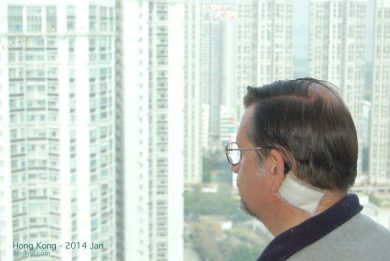
I’ll look like this for a week or so. Here I am, overlooking apartments in HK.
First, keep in mind that there is a language barrier to reckon with. The two doctors I saw there spoke wonderful English, but many on the hospital staff spoke little or no English. Back in 1985 when I first visited, Hong Kong was under British Administration and English was everywhere, but since 1997 this territory has been a part of The Peoples Republic of China, and English usage has slipped dramatically. About five years ago, restrictions forbidding Chinese citizens from visiting HK started to ease, and today, wealthy Chinese people flood into Hong Kong to visit Disneyland, seek medical care, and shop for luxury goods that are 15-50% cheaper than they are on the mainland. Due to the influx of Mainland citizens, many in HK have started to study spoken Mandarin. But Cantonese is the local dialect, a language as distinct from Mandarin as French is from Italian. Furthermore, Mainland China also uses a simplified Chinese script while Hong Kong still uses traditional characters. To give you a rather extreme example of the script difference, you’ll find this on “yield” signs in China (让), but this is how it looks in Hong Kong (讓). Nonetheless, educated Chinese people can read most of the signs in Hong Kong—a distinct advantage over me, for although I have studied Mandarin for three years (and lived in China for 15), I am functionally illiterate in written Chinese.
I like to ask Hong Kong taxi drivers and sales-people if they speak English; after their horrified look of incomprehension, I ask (in Mandarin) if they understand the common language of the mainland. Greatly relieved, they usually say, “I can understand some Mandarin, but can’t speak it.” And they are right! It is often very difficult for me and for visitors from the Mainland to understand what HK people are trying to say in Mandarin Chinese.
This language barrier proved to be an issue at Evangel Hospital too, and as in other places, these local nurses, cashiers and orderlies were amazed to learn that we could communicate in broken Mandarin—amazed, and grateful that they didn’t have to use English! Most of the day’s communication was a mixture of American English, British English and Mandarin, with plenty of pointing and assuming (as we all had to “fill in the gaps” of our garbled communication).
The process began at about 10:15 am, at the hospital intake desk by the front door. I said I was scheduled for surgery at 11:30, and had been told to report at 10:30; the receptionist looked at my appointment card, typed a few things into the computer, and—rather puzzled—said she couldn’t find my appointment. Undaunted (I’d been there on Wednesday for the initial consultations, on two issues with two doctors), I produced more papers and insisted that the appointment was real. I even showed that I had paid a deposit of $15,000HK ($1932US). At that point the light dawned and she realized that I needed to “go upstairs” to the out-patient desk on the “theatre wing.” Fortunately, I knew that “theatre” was British English for “operating room”, so I had no illusion that I was going to be watching a movie!
I was soon on the third floor, sitting in a room with three curtained beds, a desk, and a bench. Next to me on the bench was a young woman wearing a stylish fur-lined coat, and an older woman whom I assumed was her mother. I never saw the man they were waiting for (behind a curtain); even though I occupied his bed when my own “procedure” was completed. While I sat there, next to these ladies, a nurse with broken English said, “Take off your underwear, its time to slit your throat”. OK, maybe she didn’t exactly say, “Take off your underwear, its time to slit your throat”, but it was close. She told me to take off my clothes—ALL of my clothes—and put on the hospital pants and “shirt” (which reminded me of a straight-jacket, and could only be tied from behind). Continuing, she said that once I’d changed I was to sit there on the bench, facing a large open doorway with a clear view all the way down the hall, for about an hour. This didn’t make me happy.
First, I thought of the last time I had a similar cyst removed. That was performed in a simple doctor’s office in Kunming, by an Australian doctor-friend, his high-school aged daughter, and an attending nurse. The daughter was there with my permission; she was going to follow her father into the field of medicine, and he was teaching her what he could ahead of her upcoming enrollment at university. In fact, I’d even given permission for her to help with the stitches—a first for her. That surgery wasn’t costing me anything beyond supplies, so it was the least I could do. And even though that cyst was in the fold between my leg and buttocks, I didn’t have to take off my underwear THAT day—why was it necessary today, when the cyst was in my neck?
My other concern was the two ladies next to me, and all the people looking into this room from their benches in the hallway (there were seats by every doorway, up and down the hall). I’ve lost many western ideas about “modesty” in my 15 years in China, but surely there was a less public place to sit; besides, it was cold (remember the fur coat next to me?)! I even protested about the underwear, hoping that it was a language problem and she just meant my “undershirt”, but no, she really meant for me to remove ALL of my clothes, plus wedding ring and glasses. With some incredulity, I asked: “I have to take off my underpants so they can operate on my neck?” “Yes” was her simple, terse reply. I said OK, but made it clear that I was going to wait a few minutes. Now, she wasn’t happy, but she didn’t have the English skills to argue.
About 15 minutes later (now 10:45 with the surgery scheduled for 11:30), a nurse with better English came in and said I really did need to go ahead and change. “OK,” I said, “But could I have a robe or something because of the cold, and do I really have to have bare feet on this cold tile floor?” Now she wasn’t happy, but a moment later she tossed me a blanket and a pair of “hotel” slippers, and I disappeared into a “toilet” (or “WC”—both British English) to change. The hardest part was getting my wedding ring off, for it had not been off my hand for quite some time, but I eventually succeeded, and emerged wearing nothing but my birthday suit, partially covered with blue hospital pants, an untied apron and two pseudo-slippers.
Once my clothes and backpack were in a locker, along with my glasses, I sat for 15 minutes feeling blind and naked. While I had been disrobing, the man and his family left, so a nurse directed me to take his place on the bed. I’d already been asked to verify my name and passport number about a dozen times (mostly two days before, but once the same morning); just before they wheeled my bed to the elevator a nurse put another paper in my face and asked if that was my name and number, to which I replied, “I can’t read a thing without my glasses” (which is entirely true—maybe my eyes need more help than my neck!). I spelled my name and she seemed content, and off we went. I’d never been wheeled anyplace before in a hospital bed, and told the nurse how stupid I felt. She asked, “Why?” Wondering how much of my English she could understand, I simply said, “Well, since the problem is in my neck, I could certainly walk instead of just laying here,” but I wanted to say: “I’m half naked, in a foreign country where the people helping me can’t understand my speech, laying on a rolling bed, going up an elevator to the ‘theater’ where I’ll be the main show, and all they are going to do is slit my throat and remove a pea-sized lump of oft-infected material before making me get dressed to return to an unfamiliar hotel.” But by this point I’d decided that I was as vulnerable as a human can be, completely in the hands of others, and the last thing I wanted was for them to be unhappy with me—so I’d just keep smiling and doing as I was told.
I don’t have much to say about the next 30 minutes. The middle-aged doctor spoke English well, was very professional, and had a reassuring manner. He explained the preliminary activities: drawing lines on the back side of my neck (so it wasn’t really my throat at all, but that sounds more serious!), getting me to lay in a certain way, removing some hair, applying cold liquid antiseptic (that dripped down my neck and onto my other ear), administering local anesthesia, etc. The “theatre” was very cold, but they had put several blankets on me (thanks!), as well as a “tent” of sorts—with an opening glued to my neck. I was reasonably comfortable, all things considered, but I couldn’t see anything except the inside of the blue tent. Of course the doctor spoke Cantonese with the half-dozen people in the room, but every few minutes asked me if I was OK and if there was any pain. There wasn’t, and I just kept saying “I’m OK.” After 15 minutes or so, a nurse poked her head into the tent and said they were almost finished and would begin the stitching soon. Once it was all over, the doctor told me that I had to keep it dry for five days, and should not change the bandage. If it looked OK after five days, the stitches (5 or 6?) could be removed. I didn’t pay much attention to the flurry of activity around me (without my glasses, nothing was clear anyway!); by this time, I was just happy that it was over with, and I was soon being wheeled back to the room where I’d started on the second floor (third floor in American English).
I wasn’t groggy or tired, though (from experience) I knew I’d lost some blood. In Kunming, I don’t remember “waiting around” before going home to bed, and I was a bit anxious to put my clothes back on. In addition, Vivian had stayed at the hotel to pack and “check out”, and by now she was probably wondering what was going on. A shuttle bus was scheduled to take us to our next hotel (and conference site) at 2:30, and it was now past noon. Once the bed was parked in it’s original spot, the curtains were drawn, and a nurse “rather authoritatively” said I was going to rest there for a few hours.
“Hours? Until when?” I asked.
“About 2 or 3 o’clock.”
“Can I at least put my clothes back on?”
“No.”
“Can I use the toilet?”
“No. Just rest.”
“OK. But I really need to leave at about 2 pm, to catch a bus.”
“Too soon. You need to rest. Do you want your cell phone from the locker?”
“I don’t have a cell phone in Hong Kong. But I would like my glasses and my watch” (which someone kindly brought me).
Now, though still feeling naked, I was at least no longer blind too. For the next half hour, I lay there trying to rest and praying that I didn’t wet the bed. (No, they had not told me to avoid food or drinks in the morning, since this was “only in my neck”.) Some issues arose about the follow-up and where to send the lab report, so every ten minutes or so, a nurse or administrator would come ask me questions. (So much for “resting.”) The litany went something like this:
“You say a different doctor might take out the stitches, mainly so you don’t have to come all the way here and pay for another visit; then how will you get the lab results?” “You say to mail them, or let another Evangel Hospital doctor see them on your follow-up for other tests? No, we can’t do that.” “By email? No, we can’t do that.” “OK, doctor say we can tell you results by email…” It was more complicated than that, but that was the gist of it.
The whole time in that room, several “nurses” came and went. Since I was laying down and trying not to move my neck, I wasn’t wearing my glasses, and thus didn’t really look at them, but by voice and English level I knew it was a series of people. My guess is that some were nurses (with various rank), while others were administrators. “Higher ranked” nurses could speak English, but many of these people spoke little English so again I was moving in and out of English and Mandarin, trying to “rest,” recuperate, communicate and control my bladder.
Sometime before 1 pm a nurse (with good English) asked if I wanted to go home. I was surprised, but said, “The sooner the better; does that mean I can get dressed now?” “Sure,” she replied, so I was soon happily relieving myself and dressing to regain “my dignity.” But then I realized that if I went to the hotel we had checked out of, there would be no where to lay down, and the bus wasn’t due until 2:30. So, after I dressed, I laid back down for another 20 minutes before heading down to “pay.” At this point, I had to wait 5-10 minutes for a “nurse” to take me downstairs (or more importantly, deal with paperwork so I could leave). The nurse who took me back to the cashier couldn’t speak English, so I asked in Mandarin: “In light of the hospital’s name, and all the pretty crosses on the walls, are most of the nurses on staff Christians?” She replied, “Yes, many are—are you?” I said yes, then asked about the doctors. “很少,” she replied (“very few”).
Downstairs, I waited another 10 minutes or so for the cashier. As they had promised two days before, this would actually be a refund, not a payment. They had charged my credit card $15,000HK on Wednesday, and would now apply for about $5000 to be refunded “in about two weeks”. If they do this with everyone, I mused to myself, it was a great way to give the hospital interest free loans for a few weeks, but I just smiled and said “Thank you.” I was pretty sure I’d be seeing this cashier again in five days when I returned for the lab consultation and removal of stitches.
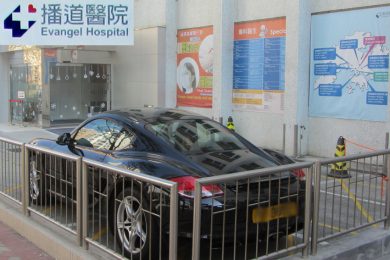
There was an “ambulance” parking space in front of the hospital, with a Ferrari in it for all to see!
As I walked out the door, I decided that it would be nice to have a photo “to remember the day” by. Photography is prohibited inside the building, and the “Evangel Hospital” sign on the main door is translucent glass so it wouldn’t show up well. But there was a Hong Kong map (of sorts) on the wall outside, which apparently shows the hospital’s many branches, so I snapped a photo from the sidewalk. Perhaps because I was acutely aware that I’d just paid about two months’ salary (as a teacher in China) for consultation with two doctors, some lab work, and today’s “throat slitting”, the car parked in front of the hospital caught my attention. It was a black Ferrari—parked in a space that said “ambulance only”. It seemed to me that a more appropriate placard beside the Ferrari would have read: “The staff thanks you for choosing Evangel Hospital. We hope your improved health enriches your life, as you have enriched ours.”
In closing, I’ll say that we Americans often try to deal with discomfort by noticing the irony and humor in our stressful situations. Proverbs 7:22 says, “A joyful heart is good medicine”; in that spirit, I’ve written up this account of my ordeal, and I hope it made you smile. All in all, I’m grateful for this clean hospital with “quite a few” people who speak English (and especially the doctors!!). I know that my nurses didn’t invent the procedures that seemed odd to me, and it probably wasn’t my doctor’s Ferrari. My nakedness was probably required to maintain the “theatre’s” strict sanitation (which is good), and the fees were far more reasonable here than they would have been in America. Actually, I have a lot to be grateful for!
Most of all, I’m grateful to God for designing this remarkable body. Even if it can’t fight off a sebaceous cyst, it successfully fights off scores of other infirmities in spite of the terrible way I feed it and deprive it of needed rest. Furthermore, within a few days, my skin will miraculously weave itself back together so these artificial stitches will no longer be needed—a feat no doctor on earth can perform. I have feet, legs and eyes that easily got me to that hospital, sound lungs that manage to process even the polluted air I give it hour by hour, a healthy heart that didn’t miss a beat in spite of the trauma to my psyche and skin, and an incredible brain that was able to locate the hospital in this huge city, not to mention its ability to facilitate communication in “second” languages.
As the adage goes, “if you don’t have health, you don’t have anything.” It’s corollary should be, “if you can’t see God in the remarkable design of your body, then you just aren’t looking.” The Bible says a lot about health; poor health often draws men to their Maker, and “restoring health” seems to be one of God’s favorite signs to weak, sinful, poor and insecure humans (there are too many verses to list, but check out Jeremiah 17:14, 30:17, 33:6; Ps 30:2, 107:20; Matt 4:24, 8:16, 15:30; and 1 Peter 2:24). When I’m tempted to feel sorry for myself, due to some impairment, all I have to do is look around and there’s always someone else in worse shape than I’m in. As I waited for the cashier, feeling bad about the big bandage glued behind my left ear, a guy came up whose entire head was encircled with gauze, and an elderly woman was able to hobble out the door only with the assistance of strong people on each side. God bless her two supporters, and God bless the medical personnel who helped her while she was inside Evangel Hospital’s doors! God uses people in every profession, medical and otherwise, to make the world a better place, whether or not they have a saving faith in Jesus Christ. May God also use this English teacher to strengthen someone who needs a steady arm, or to point them to the real source of all life and healing.
I’ll end with a favorite benediction, from 3 John 2 (NRSV) “Beloved, I pray that all may go well with you and that you may be in good health, just as it is well with your soul.”
Jan 28, 2005
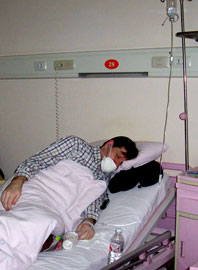
Blog post in Xi’an, China:
My students and I suffered through exams January 4 and 6 — they suffered by taking them and also by having to listen to me cough while grasping my side in pain. My teaching assistant had heard enough coughing (for weeks), so after my last exam he insisted on serving as translator on a visit to a nearby hospital. There, I was told that I had pneumonia (肺炎), and thus I spent the following two weeks in the hospital with an IV (输液) dripping medicines into my body for about six hours a day. I was treated well, and my Chinese was good enough to entertain the nurses and do whatever they asked. I also learned several new medical terms that I hope to never need again! The doctors wanted to keep me a few extra days, but I had already purchased a ticket to fly to Qingdao (on China’s northeastern coast). The doctors said the change in air would probably be good for me, so on January 20 I flew out a few hours after being liberated from the last IV. (By the way, while I was in the hospital, Vivian was under a doctor’s care for bronchitis –支气管炎– so we really gave our colleagues something to worry about!)
This was the first time I’d been in a hospital since I was in the fifth grade (and that was for a similar reason). Before I came to China, I caught colds frequently, but I was never sick enough to miss work. All of this makes my persistent illnesses in China both disturbing and depressing.
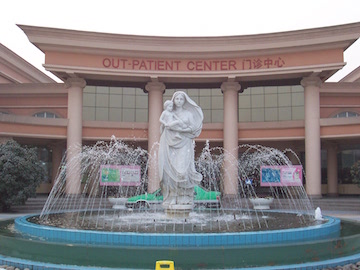
It’s not every day that you see a Madonna and Child in China, but this is the front of a joint-venture hospital, which particularly markets to expectant mothers.
A western doctor in Qingdao ordered an X-ray and said the pneumonia was gone. However, after a week in clean air I am still coughing up phlegm, and my side/rib still hurts [they say I cracked it] when I cough/clear my throat/sneeze/etc. I am writing this update at a hotel on the Hong Kong border, where Vivian and Andrew will fly to meet me later today. We will spend the next week in Hong Kong (with other foreign professionals), followed by a week in Xiamen for a mini-reunion with a few classmates from 20 years ago. We are praying that by the time we return to Xi’an my lungs will have recovered enough to face the rest of this school year.
Trying to breathe in China,
Michael Krigline for the family
PS in May 2005: Once the coal fires stopped burning, Xi’an’s haze parted to reveal things more than a block away again. We still live with a morning cough, but the doctors say to expect this (or worse) as long as we live in Xi’an. With that sobering thought in mind, and much prayer, we decided to look for bluer skies, and we have found them in Kunming. Two days ago I received a contract to teach next year at the Yunnan Normal University Business School (you can see a few Kunming photos by clicking here).
